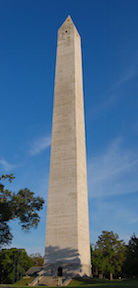Robert Penn Warren, Jefferson Davis, and the Construction of a Monument
 In his 1980 essay “Jefferson Davis Gets His Citizenship Back,” first printed in The New Yorker and later published as a short book, Robert Penn Warren reflected on the construction of a monument to former Confederate President Jefferson Davis. That monument now serves as the centerpiece of Jefferson Davis State Historic Site in Fairview, Kentucky.
In his 1980 essay “Jefferson Davis Gets His Citizenship Back,” first printed in The New Yorker and later published as a short book, Robert Penn Warren reflected on the construction of a monument to former Confederate President Jefferson Davis. That monument now serves as the centerpiece of Jefferson Davis State Historic Site in Fairview, Kentucky.
Like Davis, Warren was a native son of Kentucky. His passage in the book about the monument’s construction captures not only his ambivalence about Davis but also about Southern influences on his upbringing in a state that officially remained neutral during the Civil War.
I came across the book version of the essay, published by the University of Kentucky Press, as one of the many great finds I picked up last week at Marc Ramsey’s bookstore in Richmond, Owens & Ramsey. Every page has a phrase or thought or some piece of writing that stands out as a gem.

In particular, I thought Warren’s reflections about the Davis monument had interesting resonance. At a time when we still struggle with issues of Southern heritage, race, and memory, Warren’s childhood experience from a century ago still feels contemporary.
“Toward the time I was ten or eleven,” Warren writes—putting the date at around 1915 or 1916—word began to circulate that “not many miles off, in the settlement of Fairview, a big monument was going to be erected to Jefferson Davis. . . .”
A monument meant jobs—even if the First World War, before our entry, was already spurring the American economy. It meant jobs with no questions asked about the color of the uniform your grandfather had worn, or even whether he had been a bushwhacker. In truth, such questions had never been of burning importance in Guthrie, where to a certain number of contemporary citizens, the Civil War seemed to have been fought for the right to lynch without legal interference.
During construction, Warren, by then old enough to drive the family Chevrolet with the help of a pillow to boost him, drove over on occasion to watch the progress.
There I might stare at the building shacks and the debris of construction from which rose a gray-write shaft, unsure of my own feelings not merely about Davis (about whom I still knew little) but vaguely, I suppose, about the mystery of the pain, vision, valor, human weakness, and error of the past somehow transformed into, glorified into, the immobile thrust of concrete (not even the dignity of stone), rising from thistle, mullein, poverty grass, and broken timbers against the blazing blue sky of summer or the paling sky of autumn.
It’s beautiful writing. It’s thoughtful writing, too. Warren admits that his attempt, in 1980, to capture what he might have been feeling in 1917 or 1918 was like trying “to make the lying words stand for the old living truth.” But for me, the point was that he took the time—both in 1918 and more than sixty years later—to think and reflect and try to make sense of things.
The reflection and, I hope, the conversations that result, continue….
Fascinating. I have been to the Davis shaft several times, it being on the way to many of the places I hold dear in Civil War memory from my humble northern abode. I find it a bit incongruous for the location.
Really enjoyed your article on Warren and the construction of the monument! Grew up in the area and attended elementary school directly across from the monument. Knew the extended Warren family, each of whom was extremely talented. Thanks for the article.